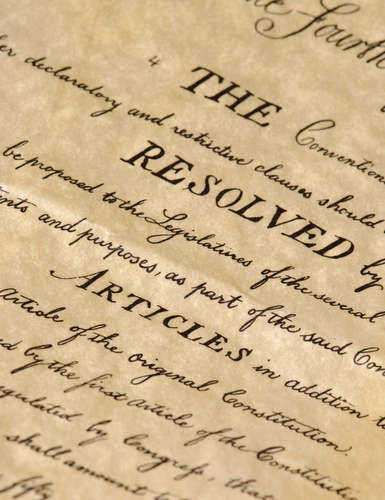"Obligation of States" In Article 4 Explained
Understanding Article 4 of the U.S. Constitution: The Obligations of States
Introduction:
Article 4 of the United States Constitution outlines the obligations that each state has to one another, ensuring that the nation functions as a united and cohesive whole. In this article, we will dive deep into the provisions and significance of Article 4, particularly the obligations that states have to one another.
Section 1: Full Faith and Credit
Section 1 of Article 4 states that "Full Faith and Credit shall be given in each State to the public Acts, Records, and judicial Proceedings of every other State." This provision ensures that legal judgments, acts, and records in one state will be recognized by all other states. This clause protects the legal rights of citizens when they travel to other states. For example, if someone gets married in one state, other states must recognize that marriage as legal.
Section 2: Privileges and Immunities
The second section of Article 4 explains that individuals are entitled to the "Privileges and Immunities" of the states they reside in or travel to. These rights include the right to travel, free speech, protection from unlawful search and seizure, and the right to earn a living. However, state residency requirements may prevent accessing certain benefits. For example, in some states, only residents have the right to bear arms.
Section 3: Extradition
Section 3 outlines the process by which individuals accused of a crime in one state can be returned to that state to stand trial or sentencing. The clause states, "No person held to Service or Labour in one State, under the Laws thereof, escaping into another, shall, in Consequence of any Law or Regulation therein, be discharged from such Service or Labour, but shall be delivered up on the Claim of the Party to whom such Service or Labour may be due." This means that if someone commits a crime in one state and escapes to another state, they will be returned to the state where the crime was committed to face trial.
Significance of Article 4
Article 4 ensures that individual rights are protected, regardless of which state they are in. It creates a foundation of reciprocity between states, ensuring that states respect one another's legal proceedings and judgments. This clause is particularly important in creating a sense of unity, helping to bind states together, and preventing a situation where states function as separate entities rather than as part of a united country.
Impact of Article 4
Article 4 has had a significant impact on the legal system of the United States. It has helped create a sense of national unity and reciprocity between the states. The Full Faith and Credit clause has been significant in protecting individual's legal rights, in cases such as same-sex marriage recognition across different states. The Privileges and Immunities clause has helped ensure that citizens' rights are respected in all states. Lastly, the Extradition clause has been instrumental in upholding criminal justice across state borders.
Conclusion:
Article 4 of the U.S. Constitution is an essential provision that outlines the obligations of states to one another. Its provisions contribute to the unity of the United States, ensuring that individuals' rights are protected and that states function as a cohesive whole. The Full Faith and Credit clause, the Privileges and Immunities clause, and the Extradition clause have all had significant impacts on the legal system of the country. These provisions ensure that the rights of the people are respected, and the rule of law is maintained across state borders.
The "Obligation of States," within Article 4 of the Constitution, is comprised of 3 specific clauses that assist in the representation of State laws. The first clause is the "Privileges and Immunities Clause".
In Corfield v. Coryell, the Supreme The court ruled that the following are banned from such practices of discrimination: government protection, rights to life and liberty, right of citizens to go from one State to the next, the right of citizens to live within varying states due to interests such as that of commerce and agriculture, rights to fair State court action, rights to property, and rights to be imposed taxes that are not any more than that which are imposed on all other citizens of one’s economic bracket.
Aside from these general rights bestowed upon all citizens, the Court did rule that New Jersey State law must allow for State residents to reserve an exclusive right to acquire clams as well as oysters within the State. Residing within Clause 2 is that of the "extradition of fugitives". This references the "Extradition Clause" which states that individuals charged with crimes of treason or felony, who have fled the State, be eligible to be reacquired in any other State so that they may be arraigned in a court that resides within the original State maintaining jurisdiction over their case.

State law must demand this, however, as is represented by an "executive authority of the state." There is no distinction placed upon the time in which the fleeing had occurred as well. It only matters that they had fled following the committing of the aforementioned crime.
The final clause included in this section is that of the "Fugitive Slave Clause." It states that individuals held as persons of service and labor not escape such a label despite having temporarily escaped such inhabitants. Such individuals, upon reacquisition, must be brought forth towards their original place escape. This Clause was eliminated altogether with the passage of the thirteenth Amendment.